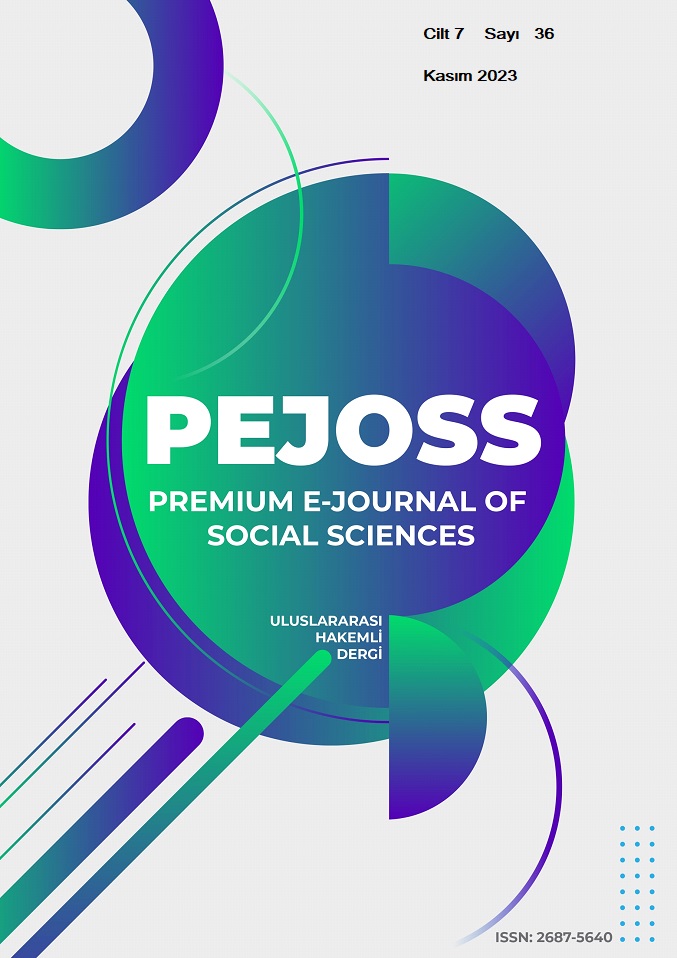The Effect of Public Expenditure Policy Implementations on Public Fiscal Balance during the Covid-19 Pandemic Period: An Evaluation on Selected Country Cases
DOI:
https://doi.org/10.5281/zenodo.8434277Keywords:
Covid-19, Fiscal Measures, Public Expenditure Measures, Public Financial BalanceAbstract
Exactly a century after the Spanish Flu swept the world, the world is facing a new pandemic. The first case emerged in the Chinese province of Wuhan in December 2019 and then spread across the world. The World Health Organization named the virus SARS-CoV-2 and used the term Covid-19 to describe the disease caused by the virus, and declared a pandemic on March 11, 2020. Acting with the motive that the priority is to save human life, governments have implemented strict measures to limit social life in the fight against the pandemic. The measures taken to limit the spread of the disease led to supply and demand shocks on the economic front. In the fight against the economic crisis caused by the pandemic, expansionary fiscal policies were prioritized within the framework of Keynesian policies, and especially expenditure-based public policies were put into practice. The expenditure-based public policy implementations adversely affected the fiscal balances and led to an increase in budget deficits and debt stocks of countries. In this study, public expenditure and public revenue policies, which are among the fiscal policy instruments implemented by selected countries in the fight against the Covid-19 Pandemic, are included and the impact of the pandemic on public fiscal balances is evaluated within the scope of selected countries.
Downloads
References
Balcı, Y. ve Çetin, G. (2020). COVID-19 Pandemi Sürecinin Türkiye’de İstihdama etkileri ve Kamu Açısından Alınması Gereken Tedbirler. İstanbul Üniversitesi Sosyal Bilimler Dergisi, 19(37), 40-58.
Chudik, A., Mohaddes, K. and Raissi, M. (2021). Covid-19 fiscal support and its effectiveness. Economics Letters, 205, 1-10. https://doi.org 10.1016/j.econlet.2021.109939.
Çapanoğlu, S. G. (2021). Avrupa Komisyonundan Mali Politikaların Koordinasyonu İçin Rehber: İktisadi Kalkınma Vakfı Dergisi.
Çelik, Ş. Ç. (2022). Covid-19 Pandemisi Sonrasında Maliye Politikaları Uygulamaları: Türkiye Özelinde Bir Değerlendirme. İslâm İktisadı Araştırmaları Dergisi, 2(1), 4-27.
Eğilmez, M. (2016). Kamu Maliyesi. Remzi Kitapevi.
Erdem, U. (2022). Brıcs Ülkeleri Ve Türkiye'de Covıd-19 Öncesi Ve Sonrası Vergi Politikalarının Karşılaştırılması. Şahin Karabulut (Ed.), Ekonomi Ve Finans Konularına Teorik Yaklaşımlar içinde (s. 361-370). Ekin Yayınevi.
Eijkelenburg, W. V. and Nauta, L. (2020). Comparing G20’s cash cannon in 2020. https://economics.rabobank.com/publications/2021/april/comparing-g20s-cash-canon-in-2020/.
Huld, A. (2022). China’s Economic Stimulus Explained – Understanding China’s Monetary and Fiscal Policy. https://www.china-briefing.com/news/chinas-economic-stimulus-explained-monetary-fiscal-policy/, (07.12.2022).
Kabayel, M. ve Doğan, A. (2021). Covid-19 Salgın Krizi ile Artan Kamu Harcamaları: Peacock Wiseman Hipotezi Uyarınca Bir Değerlendirme. İbrahim Atilla Acar Ve Binnur Açıkgöz (Ed.), Pandemi Ekonomisi içinde. (s.49-77). Dora Yayıncılık.
Kısa, Ö. (2021) Salgın Döneminde Maliye Politikası. Vergi Raporu. 267, 93-110.
KPMG. (2020a). ChinaGovernment and institution measures in response to COVID-19. https://home.kpmg/xx/en/home/insights/2020/04/china-government-and-institution-measures-in-response-to-covid.html.
KPMG. (2020b). BrazilGovernment and institution measures in response to COVID-19. https://home.kpmg/xx/en/home/insights/2020/04/brazil-government-and-institution-measures-in-response-to-covid.html.
Koç, İ. ve Yardımcıoğlu, F. (2020). Covid-19 Pandemi Sürecinde Uygulamaya Konulan Mali Tedbir ve Teşviklerin Karşılaştırmalı Analizi: Türkiye ve Seçilmiş AB Ülkeleri Karşılaştırması: Siyaset, Ekonomi ve Yönetim Araştırmaları Dergisi, 8(2), 123 – 152.
Lacey, E., Massad, J. and Utz, R. (2021). A Review of Fiscal Policy Responses to COVID-19. Macroeconomıcs, Trade And Investment Equıtable Growth, Fınance & Instıtutıons Insıght, World Bank Group, https://openknowledge.worldbank.org/bitstream/handle/10986/35904/A-Review-of-Fiscal-Policy-Responses-to-COVID-19.pdf?sequence=1&isAllowed=y.
PwC. (2020). Tax measures in response to COVID-19. https://www.pwc.com/gx/en/services/ tax/navigate-the-tax-measures-in-response-toCovid-19.html.
Sandalcı, U. (2020). Koronavirüs (COVID-19) ve Vergi Gelirleri. Vergi Sorunları Dergisi, 385: 109-126.
Sareceno, F. (2022). The return of fiscal policy The new EU macroeconomic activism and lessons for future reform, International Labor Organisation, ILO Working Paper 56.
Shi, Y., Chen, C. and Park, S. (2022). Managing the COVID-19 crisis by fiscal strategies: Lessons from four countries. Chinese Public Administration Review, 13(1-2), 3–14.
Statista. (2022a). Value of COVID-19 fiscal stimulus packages in G20 countries as of May 2021, as a share of GDP. https://www.statista.com/statistics/1107572/covid-19-value-g20-stimulus-packages-share-gdp/.
Statista. (2022b). Forecast of the current healthcare spending in Brazil from 2010 to 2025. https://www.statista.com/forecasts/1149171/healthcare-spending-forecast-in-brazil.
Strazewski, L. (2020). Pandemic helped drive health spending past $4 trillion in 2020. https://www.ama-assn.org/delivering-care/patient-support-advocacy/pandemic-helped-drive-health-spending-past-4-trillion-2020.
İnternational Labor Organization, (2020). İşgücü piyasası politikaları ve istihdam hizmetleri, COVID-19 politika önlemlerinin kritik unsurlarıdır. https://www.ilo.org/ankara/areas-of-work/covid-19/WCMS_754375/lang--tr/index.htm.
İnternational Labor Organization ILOSTAT. (2022). Unemployment rate by sex and age, ILO modelled estimates.https://www.ilo.org/shinyapps/bulkexplorer13/?lang=en&segment=indicator&id=UNE_2EAP_SEX_AGE_RT_A.
İnternational Labor Organization. (2022). ILO Monitor on the world of work. Tenth edition Multiple crises threaten the global labour market recovery. https://www.ilo.org/wcmsp5/groups/public/---dgreports/---dcomm/---publ/documents/briefingnote/wcms_859255.pdf.
İnternational Labor Organization (2021). COVID-19 and the world of work Country policy responses. https://www.ilo.org/global/topics/coronavirus/regional-country/country-responses/lang--ru/index.htm#UN.
International Monetary Fund. (2021). Polıcy Responses To Covıd-19. https://www.imf.org/en/Topics/imf-and-covid19/Policy-Responses-to-COVID-19#A.
International Monetary Fund. (2022). Fıscal Monıtor Internatıonal Monetary Fund Fiscal Policy From Pandemic To War. https://www.imf.org/en/Publications/FM/Issues/2022/04/12/fiscal-monitor-april-2022.
International Monetary Fund. (2023). World Economic Outlook database: April 2023. https://www.imf.org/en/Publications/WEO/weo-database/2023/April/weo-report?c=132,134,136,&s=GGR,GGX,&sy=2021&ey=2023&ssm=0&scsm=1&scc=0&ssd=1&ssc=0&sic=0&sort=country&ds=.&br=1.
OECD. (2020). Coronavirus (COVID-19): SME Policy Responses, Tacklıng Koronavırus (Covıd-19): Contrıbutıng To A Global Effort. https://read.oecd-ilibrary.org/view/?ref=119_119680-di6h3qgi4x&title=Covid 19_SME_Policy_Responses.
OECD. (2021). Health spending. https://data.oecd.org/healthres/health-spending.htm#indicator-chart.
The State Council of the People's Republic of China. (2020). Full Text: Report on the Work of the Government. http://english.www.gov.cn/premier/news/202005/30/content_WS5ed197f3c6d0b3f0e94990da.html.
The World Bank. (2022a). Map of SME-Support Measures in Response to COVID-19. https://dataviz.worldbank.org/views/SMECOVID19/Overview?%3Aembed=y&%3AisGuestRedirectFromVizportal=y&%3Adisplay_count=n&%3AshowAppBanner=false&%3Aorigin=viz_share_link&%3AshowVizHome=n.
The World Bank. (2022b). Social Protection and Jobs Responses to COVID-19: A Real-Time Review of Country Measures. https://documents1.worldbank.org/curated/en/110221643895832724/pdf/Social-Protection-and-Jobs-Responses-to-COVID-19-A-Real-Time-Review-of-Country-Measures.pdf.
The World Bank. (2022c). COVID-19 (Coronavirus) Policy Response to to Macro-Fiscal Policy in Russia. https://www.worldbank.org/en/country/russia/brief/covid-19-response-macro-fiscal-russia.
Downloads
Published
How to Cite
Issue
Section
License
Copyright (c) 2023 Premium e-Journal of Social Science (PEJOSS)

This work is licensed under a Creative Commons Attribution 4.0 International License.


